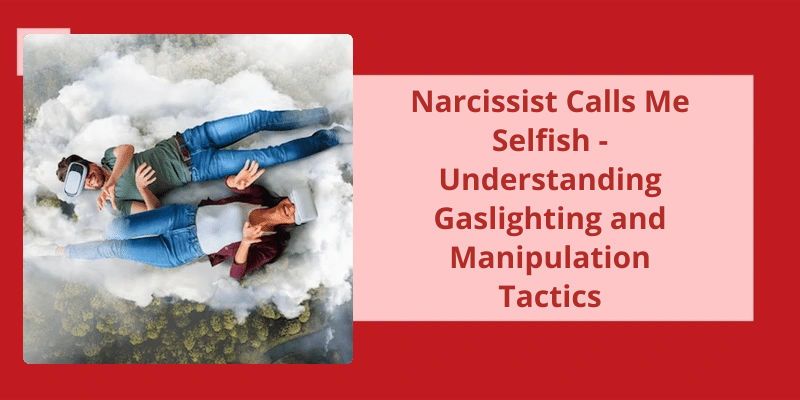It isn’t uncommon to encounter individuals who display narcissistic tendencies in their behavior and personality. These individuals often have a heightened sense of self-importance and require constant validation from those around them. However, when confronted with their own toxic behavior, they may resort to gaslighting tactics and attempt to shift the blame onto others, labeling them as selfish or self-centered. This behavior isn’t a reflection of your character but rather an attempt by the narcissist to avoid accountability for their actions. It’s important to understand the dynamics at play and not take such accusations personally. This will allow you to maintain a healthy sense of self and protect yourself from the emotional manipulation of narcissistic individuals.
Why Does a Narcissist Call You Selfish?
Despite being notoriously self-absorbed, narcissists often have a fragile sense of self-esteem and can become defensive when their actions are called into question. This defensiveness can manifest in accusations of selfishness or self-centeredness towards those who dare to criticize them. By labeling others as “toxic,” narcissists shift the blame away from themselves and onto someone else, allowing them to maintain a false sense of superiority and control.
Unfortunately, this behavior can be incredibly damaging to the people who’re on the receiving end of it. Being called selfish or toxic can cause individuals to doubt themselves and their actions, even when they aren’t in the wrong. It’s important to recognize that this behavior isn’t a reflection of your worth as a person, but rather a tactic used by narcissists to protect their own fragile egos.
By labeling someone as “selfish,” they can justify their own selfish behavior and continue to act in their own self-interest without fear of consequence. This can be especially harmful in personal relationships, where the narcissist may use this tactic to keep their partner in a constant state of confusion and self-doubt.
It’s important to remember that you aren’t responsible for the narcissists behavior or feelings, and that you deserve to be treated with respect and kindness. By setting boundaries and standing up for yourself, you can take back control of your life and protect yourself from the damaging effects of narcissistic behavior.
How to Identify and Deal With Narcissistic Behavior in Relationships
Narcissistic behavior in relationships can be identified through signs such as constant need for admiration, lack of empathy, and sense of entitlement. Dealing with it requires setting boundaries, communication, and understanding that change in the narcissistic behavior is unlikely. Seeking professional help may also be necessary.
While overt narcissism is the most well-known form of narcissistic personality disorder (NPD), there are other types worth exploring. Despite differences in manifestation and behavior, all types of NPD share a common core of excessive self-love and a lack of empathy towards others. Let’s take a closer look at the various forms of NPD and how they affect those who’ve it and the people around them.
What Is the Most Common Narcissistic Personality Type?
People with overt narcissism tend to possess an inflated sense of self-importance and may be quick to belittle or intimidate others who they perceive as inferior. They may also manipulate situations and people to get what they want. This type of narcissism is often associated with those in high-profile positions, such as politicians and celebrity figures.
Another common narcissistic type is covert narcissism, or communal narcissism. Those with this type of NPD often present as selfless and caring, and may go out of their way to be helpful to others. However, this behavior is often motivated by an underlying need for validation and attention. Oftentimes, those with covert narcissism feel a deep-seated sense of insecurity, and will use their apparent altruism as a way to gain approval and admiration from others.
There’s also a subtype of overt narcissism known as malignant narcissism. This is characterized by a combination of psychopathy and narcissistic traits, and is often associated with individuals who’re particularly dangerous or charismatic. Those with malignant narcissism may exhibit a lack of empathy, a tendency towards impulsivity, and a disregard for both social norms and the welfare of others.
One of the most concerning aspects of narcissistic personality disorder is that it can be difficult to identify, particularly in it’s early stages. Those with NPD are often highly skilled at manipulation and may be incredibly charming, making it easy for them to win people over and maintain a sense of control. However, over time, their behavior may become more obvious, and those close to them may begin to realize that something is amiss.
Understanding the motivations behind a narcissist’s insulting behavior can be a key step in protecting yourself from their toxic influence and developing healthy relationships. By examining the reasons why they insult others, you can gain insight into their deeply ingrained patterns of behavior and learn how to create boundaries and set limits that protect your emotional well-being. So, let’s take a closer look at why narcissists feel the need to insult those around them.
Why Does the Narcissist Insult Me?
Firstly, narcissists often insult others as a form of projection. This is when they take their own flaws and negative traits and project them onto other people. For example, if a narcissist is feeling insecure about their intelligence, they might insult someone elses intelligence to make themselves feel better. This projection also helps them avoid taking responsibility for their own actions and flaws.
They believe that they’re superior to others and that by putting others down, they can feel better about themselves. Insulting others is a way for them to inflate their own ego and maintain their sense of superiority.
This is a way for them to feel powerful and in control. By making someone feel small and powerless, the narcissist can feel bigger and more important. They may do this by criticizing someones appearance, intelligence, or accomplishments.
Fourthly, narcissists often use other people as scapegoats for their own problems. By blaming others for their mistakes and shortcomings, they can avoid taking responsibility for their actions.
The Role of Childhood Experiences in the Development of Narcissistic Personality Disorder.
- Childhood trauma can contribute to the development of narcissistic personality disorder.
- Children who’re constantly praised and told they’re special may develop narcissistic traits.
- Parents who’re overly critical and demand perfection may also contribute to the development of narcissistic personality disorder.
- Children who’ve been neglected or abandoned may develop a need for attention and validation, which can lead to narcissistic traits.
- Early experiences of shame and humiliation can also contribute to the development of narcissistic personality disorder.
- Healthy childhood experiences, such as consistent love, care, and support from parents can help prevent the development of narcissistic personality disorder.
Source: Why do narcissists insult and belittle everyone around them?..
Dealing with a narcissist can be a challenging and emotionally draining experience, especially when they resort to name-calling and belittling. However, it’s essential to understand the underlying motivations behind their behavior and how to handle such situations effectively. In this article, we’ll delve deeper into why narcissists call you horrible names and provide you with some practical tips on how to deal with them.
Why Narcissists Call You Horrible Names?
Narcissists have a tendency to blame and criticize others for their own flaws and shortcomings. So when they call you horrible names, it’s often a form of projection. This means that they’re projecting their own negative thoughts and feelings onto you in an attempt to make themselves feel better. It’s crucial to understand that these hurtful words aren’t a reflection of your character or worth, but rather a manifestation of the narcissists own insecurity and inadequacy.
When a narcissist calls you toxic, it’s also important to recognize that this is a common tactic used by abusers to manipulate and control their victims. By labeling you as toxic, they’re attempting to isolate you from your support network, making you more vulnerable and easier to control. It’s crucial to seek support from trusted friends and family members, or even a therapist, to help you navigate the complexities of being in a relationship with a narcissist.
Furthermore, narcissists often use verbal abuse as a means of creating chaos and confusion in their relationships. By constantly changing the rules and expectations, they keep their victims on edge and unsure of themselves. This can lead to feelings of anxiety, depression, and a loss of self-identity. It’s important to recognize these tactics and set healthy boundaries to protect your mental and emotional well-being.
Remember that their behavior isn’t a reflection of your worth, and that their words are often a projection of their own insecurities and inadequacies. By setting clear boundaries and prioritizing self-care, you can navigate the complexities of being in a relationship with a narcissist and ultimately, safeguard your mental and emotional health.
Signs That You Are in a Relationship With a Narcissist
- You feel constantly criticized and belittled by your partner.
- Your partner often talks only about themselves and seems disinterested in your thoughts and feelings.
- Your partner demands constant attention and validation from you.
- Your partner often manipulates you to get their way.
- Your partner lacks empathy for others, including you.
- Your partner has a sense of entitlement and expects special treatment.
- Your partner blames others for their problems and refuses to take responsibility for their actions.
- Your partner has a history of unstable relationships and a pattern of idealizing and devaluing their partners.
It’s easy to fall into the trap of thinking that the people who stay with narcissists must be weak or somehow deserving of the treatment they receive. However, the reality is far more complex than that. In many cases, those who stay with narcissists are kind-hearted individuals who simply can’t see the reality of the situation they’re in. They’re often so focused on the good in their partner that they overlook the bad, believing that they can somehow change them or make the relationship work. Unfortunately, this is rarely the case, and those who stay with narcissists often end up suffering in the long run.
What Type of Person Stays With a Narcissist?
They might feel responsible for the narcissists happiness and well-being, and therefore, they’re willing to tolerate emotional or even physical abuse. These individuals may also have low self-esteem or a fear of abandonment, causing them to cling to their partner no matter how toxic the relationship is.
In some cases, a person might not even realize they’re in a relationship with a narcissist. Narcissists are skilled at manipulating their victims and making them believe they’re the problem. They may make them feel guilty or responsible for the narcissists behavior, which can be debilitating and confusing for the victim.
Additionally, a person might feel trapped in the relationship because they’ve invested so much time, effort, and energy into their partner. They may believe that if they just stick it out, things will improve. Unfortunately, this is often not the case, and the abuse can escalate as the narcissist gains more power and control over their victim.
For some people, staying with a narcissist is a way to cope with their own emotional pain. They might feel that they aren’t worthy of love and attention, and therefore, they settle for someone who treats them poorly. This type of thinking is dangerous and can lead to long-term emotional damage.
Conclusion
It's important to recognize that narcissists often have deep-seated insecurities and feel the need to belittle others in order to feel better about themselves. The accusations they make towards you’re often projections of their own flaws and shortcomings. It's important to set healthy boundaries with narcissists and prioritize your own well-being. Remember that their behavior isn’t your fault and you deserve to be treated with respect and kindness. Seek support from trusted friends or professionals if you need it, and don't be afraid to distance yourself from toxic relationships. Ultimately, prioritizing your own emotional health and healing is key to breaking the cycle of toxic patterns and living a fulfilling life.






